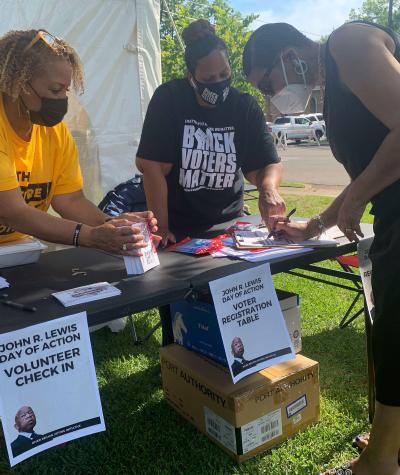Our democracy works best when every voter can participate, and civic engagement groups help make that possible by helping more people engage in our democracy and assisting those who need it. But Alabamians are now confronted with a new law that restricts their ability to help their neighbors vote and make their voices heard.
On March 20, 2024, Alabama enacted a law, SB 1, that would impose significant consequences for anyone who assists voters in the absentee ballot application process.
This includes criminalizing individuals and groups who help voters who can only apply for an absentee ballot with assistance, including incarcerated voters, disabled voters and senior citizen voters who require assistance. This cruel law penalizes actions as simple as accepting or giving gas money to take an absentee ballot application to a local election office with up to 20 years in prison.
This law takes aim at the decades-long work of nonpartisan civic engagement groups to make voting accessible and ensure that every voter can exercise their freedom to vote and is the latest development in Alabama’s long history of restricting the political engagement of Black voters and other marginalized communities.
Under SB 1, volunteers in nonpartisan civic engagement groups and voters seeking their help with absentee ballot applications could face criminal penalties ranging up to 20 years in prison. This is a serious threat to Alabamians' freedom to vote — and it cannot stand.
The work of nonpartisan civic engagement groups is at the core of building a better democracy — and when states limit these groups’ efforts, they also attack their First Amendment rights to participate in the political process. Alabamians who want to make their voices heard and help their friends and neighbors do the same shouldn’t have to fear criminal penalties.
Alabama's law stands out as one of the harshest in the nation, particularly impacting historically marginalized communities. The voters who benefit the most from the work of nonpartisan civic engagement groups, including Black voters, incarcerated voters, disabled voters and low-literacy voters, are disproportionately impacted by anti-voter laws such as SB 1.
To safeguard the rights of both voters and nonpartisan civic engagement groups, Campaign Legal Center (CLC), alongside our partners, filed a lawsuit on behalf of Greater Birmingham Ministries, League of Women Voters of Alabama, and the Alabama Disabilities Advocacy Program to protect the First Amendment rights of nonpartisan civic engagement groups and defend Alabamians’ freedom to vote.
CLC’s partners include Southern Poverty Law Center (SPLC), ACLU of Alabama (ACLU-AL), NAACP Legal Defense Fund (LDF), and Alabama Disabilities Advocacy Program (ADAP).
Nonpartisan civic engagement groups — composed of civic-minded, democracy-loving, everyday Americans — do the hard work of fighting to ensure that every American can access the fundamental freedom to vote. We should celebrate, not punish, the people who help voters make their voice heard.

